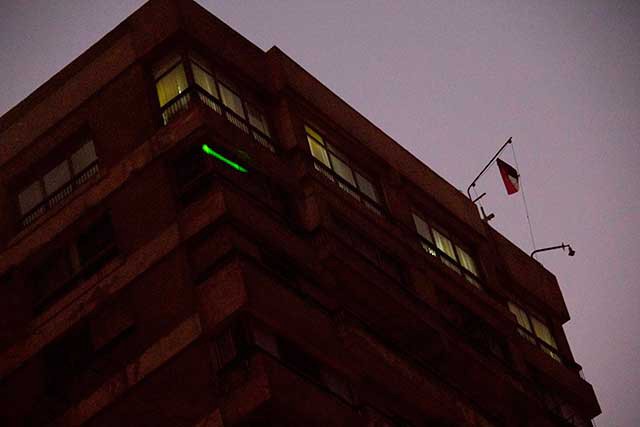Flip Off Leads To Flip Over
“A woman caused an accident SR 512 on Monday when she lost control of her vehicle as she was giving another driver ‘the bird,’ the Washington State Patrol said.”
When Mario Dies

“In the 8-bit days, death meant losing all your character’s attributes, all his jewels, coins, weapons and experiences. It was in some ways like real-life death (or maybe the Buddhist version of it.) You were forced to start over absolutely, from nothing. There was a certain Puritanical satisfaction in this hard reality, I must say. You must learn your lesson, the game’s underlying message seemed to suggest. There is no free ride for you, not ever. (Human ingenuity being what it is, there were, and are, a number of ways to foil the unpleasant consequences of total 8-bit doom. For example, there’s this gang of modern NES enthusiasts I know at Oberlin College who recently kept a single game of Super Mario Brothers 3 going uninterrupted for over a month, and came in the fullness of time to taste the joys of the eighth world. World without end, amen.)”
— In the midst of Mario-death we are in life et cetera.
How Long You'll Feel Bad After A Breakup

This will come in handy later: “Therapists say the emotional stages after a breakup parallel the well-known stages of grief: denial, anger, bargaining, depression, acceptance, rebuilding. In general, the more meaningful the relationship, the longer it will take to move through the stages after a breakup. Figure a couple months for a short relationship, six months to a year for one that lasted a few years, and two to three years to recover after a long-term marriage, says Tina B. Tessina, a marriage and family therapist in Long Beach, Calif.” Of course this cycle is more difficult for men, but either way it’s not easy. At least you finally have an idea of how long it’ll last.
Photo by CREATISTA, via Shutterstock
Gaddafi Not Like Hitler, Says Former Libyan Prime Minister Abdel-Salam Jalloud
“He is not like Hitler, who had the courage to kill himself.”
— Finally, something that is not like Hitler.
It's A Beautiful Day

Have you BEEN outside yet? It is pretty much a perfect day. The sun is shining, the temperature is delightful, what few clouds there are possess a pleasing shape and an unthreatening disposition. Every aspect of an ideal day has assembled itself in our skies. You need to get out there now: It is not going to get any better than this. And I don’t just mean the weather, although of course that won’t last either. No, I’m talking about the rest of your life, which, after today, will be a grim collection of failures and humiliations, setbacks and disappointments. Your remaining time here on earth will be spent in varying degrees of self-loathing and self-doubt, your sorrows compounded by the ever-growing realization that when the icy fingers of Death tap you on the shoulder, the few underwhelming accomplishments you have managed to realize in your pathetic, deluded tenure on this ground will count for nothing, and soon after you’re gone there will be little of consequence remaining to suggest that you were even here. Life having ground you down into dust, the dust will disperse, making no mark and leaving no trace. But it is seriously super-nice out there right now, you should totally go enjoy it.
If Porn Stars Can't Teach in Schools, What Will Become of America?
But yes: where will this witch-hunt stop? (Probably at “people who have starred in pornography.”) In way more important news, here’s a little video of his recent flight to Cuba. No big deal, just the cabin filling up with smoke. This man has a very exciting life!
UPDATE: This is even better. An experienced traveler in the region writes: “He’s on a 60s-era Soviet jet which the U.S. FAA refuses to allow to fly into American airports because it violates all known safety regulations. (i.e. it’s literally held together with duct tape). However, the Bahamas — where this guy (and me) likely flew out of into Havana — has no problem with these ancient Cubana Airlines jets…. The smoke is in fact MIST, released on purpose. It has something to do with decompression or depressurization of the cabin as the plane lands. *No one* explains this to you on the flight, btw. Longtime travelers just know and offhandedly shrug while the rest of us start freaking out.” Huh. NO THANK YOU.
Jerry Leiber, 1933-2011
The video above, of the songwriting duo Jerry Leiber and Mike Stoller, from the game show “What’s My Line?,” will give you a good idea about just how much the world has changed since they started writing songs like “Hound Dog” and “Jailhouse Rock,” and how much their songs had to do with that change. “You’ve both won very great success,” says the show’s host, who moments earlier had called rock and roll a “fad in the country.” And: “Congratulations to you, I hope you have a chance to enjoy it and to go on and perhaps do more serious things in music.”
Leiber and Stoller would of course continue to write music, songs like “Yakety Yak,” “Love Potion No. 9,” “Fools Fall in Love,” “On Broadway” and “Stand By Me” — songs that have become a very important part of American culture. Jerry Leiber died yesterday in Los Angeles of heart failure; he was 78.
Monument Mountain

Because I had only planned to stay in the Berkshires for less than a day, my friend suggested we go on a hike up Monument Mountain. I agreed: New York City has a lot going for it, but mountains are not included. I was also happy to take my mind off of a reading I was scheduled to give that night as part of a local arts festival. My slot was between two bands, which when I accepted the invitation sounded great in theory but felt more problematic as I saw myself talking to a bunch of drunks about opera, German Romanticism and the challenges of being a non-heterosexual writer of literary fiction in the modern era. If I was going to be killed, I thought, at least I could first find a nice place to scatter my ashes.

On the way to the mountain, we drove past some serious mansions in the town of Sturbridge, where there is “old money.” Not that the Berkshires, generally speaking, are exactly thriving, at least from an economic standpoint. Mansions and double-wide baby strollers notwithstanding, we were, according to my friend, in what could be considered “the Detroit of Western Massachusetts,” meaning that the middle or working class has been decimated by a loss of manufacturing jobs. “Oh, you mean it’s just like Manhattan,” I said, and we both laughed the resigned and rueful laughs of those too old to worry about the downward trajectory of western civilization, at least in any practical terms. Still, as we began our ascent, it seemed incredible that at one point in time a government agency had acquired the money (presumably through “taxes”) to carve out a path and steps through the woods, allowing any member of the public to make the hike and enjoy the view. Based on the evidence in front of me, we used to be very democratic!¹ If the New World were being discovered today, I reckoned the best spots would be sold off for condominiums with wraparound terraces and infinity pools. (Moreover, I would probably be first in line to buy one if I had the money.)
¹ I later learned that the preserve was given to a trust by a private landowner in 1899, along with an endowment, but whatever, you know what I’m saying. Just take a trip to your local state or national park, and you’ll see what I mean.

Rather than lose myself in the quagmire of socioeconomics, I focused on the moss-and-fern-and-white-birch aesthetic that made problems of any stripe seem very far away. We passed a group of students staring at a tin of what I had to believe were hallucinogenic brownies, and I felt sorry and not sorry that I wasn’t also tripping my ass off. We paused to let a little eft cross the path in front of us. (The eft being the land-based stage of the red-spotted newt, and also a denizen of crossword puzzles.) “He thinks he’s hiding from us,” my friend said, and I knew exactly how the eft felt.

As we soldiered ever higher, I asked my friend why this mountain was called “Monument Mountain.” He told me that “during William Cullen Bryant’s sojourn in Great Barrington (1815–1825), Bryant penned a lyrical poem that tells the story of a Mohican maiden whose forbidden love for her cousin led her to leap to her death from the mountain’s cliffs. In the poem, Mohicans created a rock cairn on the spot where she lay buried, giving the mountain its name — Mountain of the Monument.” In fact, as you probably guessed, my friend said no such thing and I learned this story from an ex post facto Google search.

Another forbidden-love fact I learned from the website about Monument Mountain was that Herman Melville and Nathaniel Hawthorne had once hiked up here together. After being caught in a rainstorm they had found shelter in a cave, where they had engaged in a “vigorous discussion” that had inspired Melville to pen Moby-Dick.

Eventually we reached the summit, where we were joined by what may have been an Eastern Kingbird.

I admired the sculptural, wind-shaped boughs of the nearby pines. I looked over the vista in every direction. None of this forest was “old growth,” meaning that it had all been chopped down before it was allowed to regrow. It was a thought that was both sad and comforting as I watched the bird, now joined by its mate, scurry through the white rocks, looking for whatever it needed to stay alive.

Matthew Gallaway lives in Washington Heights and is the author of The Metropolis Case.
The Strangely Carnival Atmosphere Outside The Israeli Embassy In Cairo
The Strangely Carnival Atmosphere Outside The Israeli Embassy In Cairo
by Christian Vachon

Back in April, Egyptians received a violent reminder that their post-revolutionary freedom to assemble in protest was a conditional one. That night was the first time activists moved demonstrations from Tahrir Square to the Israeli embassy in protest the Gaza occupation. By 2 a.m., the Egyptian army (known as the SCAF) had received orders to attack the group. Soldiers fired rubber bullets into the crowds and tear-gassed the corridor, killing one and taking hundreds into custody.
The message from the SCAF was clear: “You may gather in protest with our blessing — but Israel is off limits.”
But last Friday, five Egyptian border security guards were accidentally killed by Israeli Apache gunships. The casualties occurred as Israel was pursuing militants who, having just attacked Israeli troop convoys (updated to add: Israeli buses and cars were also targeted by the militants, and eight Israelis killed), were retreating into the uncontrolled, lawless Sinai. In the wake of these deaths, protesting against Israel has become fair game. By Saturday afternoon, a sit-in of thousands outside the Israeli embassy had entered its second day.
The Israeli embassy office in downtown Cairo is hidden in a nondescript concrete 21-floor residential structure. A small Israeli flag strung from the top floor is the only sign of the embassy’s presence in the building. Nearly invisible to passing pedestrians on this busy street, the flag is little more than a whispered announcement of Israel’s diplomatic mission in the country. This anonymity is emblematic of Egypt’s naïve and unsuccessful attempts to minimize its diplomatic relationship with Israel in the eyes of a largely disapproving public by simply hiding it away from view. The policy extends to the Ministry of Education, which prohibits any schools — public or private — from teaching any material related to Israeli history or Egyptian-Israeli relations.

“All of this is absurd,” Nour, a 30 year-old Egyptian interior designer told me as we drove to the Israeli embassy protests. “Even if we wanted to, Egypt could never go to war with Israel. For all of the military aid the U.S. gives us, we’re only allowed to buy weapons to contain our own people. We’ve never been allowed to purchase the weapons systems necessary for a foreign invasion.”
Outside the embassy, a military cordon had gone up. A line of armored army personnel carriers had amassed along the front entrance of the property. Soldiers, looking bored and indifferent, sat atop them, machine guns pointed towards the crowd. In front of the vehicles stood a line of police officers and army soldiers in riot gear who watched and talked with protestors as, in the crowd, Israeli flags were burned amid chants of “Death to Israel” and “Allah Akbar.”



Yet, despite the midday heat and the imposing security presence, a spirit of ease prevailed, as if an unspoken guarantee of safety had been sent down the chain of command and the crowd somehow knew a repeat of April’s events was unlikely. In a country of factions — Salafis and Muslim Brothers; Copts and Muslims; military and civilians — a crowd had united around this rare opportunity to protest as a single entity against Israel. People reveled in this sudden freedom. Sweating beneath the sun, they used chains to beat the fallen barricades erected to safeguard the embassy’s building — but there was no dangerous edge to the scene. Gone were calls against the SCAF and demands to end the military trials that have left over 10,000 Egyptians incarcerated. Instead the crowd seemed content to swelter together while sending up chants to the empty Israeli embassy offices.
Even the Egyptian police, watching from beneath the visors of their black helmets, were a peaceful addition to the scene. The Egyptian police apparatus is the most despised social institution of this country; one blamed for decades of corruption and human rights abuses. It was these officers who were responsible for killing hundreds of revolutionaries in street battles throughout the revolution. Now this crowd had gathered to demand retribution on their behalf. In the crowd, there was little sense of irony about this — it didn’t matter. Israeli bullets had transformed the police guards from oppressors to the oppressed, from tyrants to martyrs.
“What do they want?” I turned to ask an 18-year-old Egyptian girl standing beside me, watching as a black flag with the Star of David on it was set on fire.
“We must cancel our relations with Israel,” she replied blankly.
By 4 a.m. on Sunday morning, the night sky had turned to pink and thousands remained. The night’s celebrity was ‘the Egyptian Flagman,’ Ahmed El-Shahat, who climbed 13 stories without a rope up the front of the building to remove the Israeli flag. An Egyptian flag was hung in its place. The scene began to feel like a carnival. I saw families with children, waving Egyptian flags, women, and teenagers shooting bottle rockets.
One of the rockets sailed up through the air and exploded with a crack as it hit the front window of the embassy office floor. An ovation rose from the delighted audience. It was a direct hit.

Christian Vachon lives in Cairo (he previously wrote for The Awl under the pseudonym Gordon Reynolds). He posts regularly to Twitter.
